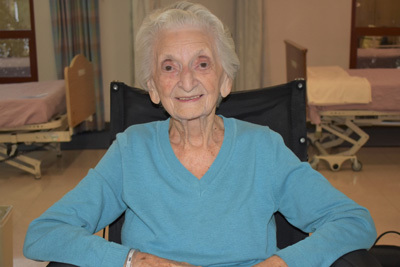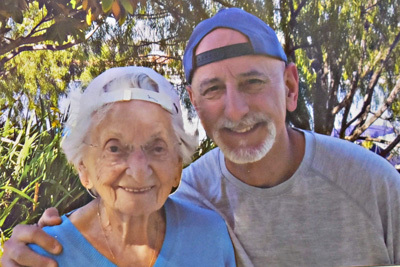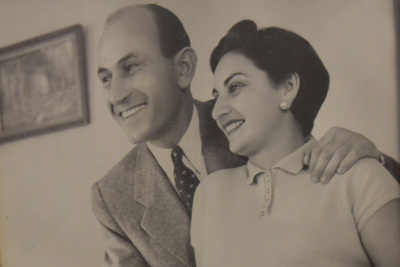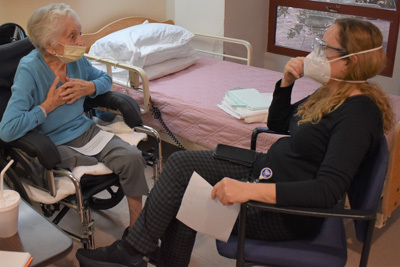A Life of Resilience—An Inspiration for All


A Life of Resilience—An Inspiration for All

Katherina "Katy" Schaffer knows what it means to face extraordinary odds. But she has also experienced, first-hand, the triumph of perseverance. Over the course of her 97 years, Katy has faced unimaginable challenges, including time spent in three Nazi concentration camps. Through them all, she has proven time and again she has the strength of spirit to carry on—and, above all else, that she is a true survivor.
A resident of Los Angeles Jewish Health's Grancell Village for the past year, Katy's story starts in 1925, in pre-war Czechoslovakia. One of six siblings, at the age of 19 she traveled to a neighboring town to become an apprentice seamstress. As Europe fell under the cloud of Nazi threat, her parents sent word that she should return home. On her way back, at a train station in the company of her older sister, Katy was abducted by the Germans. So began an odyssey that would subject her to the unimaginable horrors of the Holocaust and leave her at death's door.
"When my mom was liberated, in 1945, she remembers airplanes dropping little bags of cheese and bread. Some people she knew in the camps, who were on the brink of starvation, ate so much that they died—their systems couldn't handle all that sustenance at once," says Katy's daughter, Erit Siegal. "Fortunately, she restrained herself, and she eventually made it to a hospital, where she recuperated for a long time."
After she was liberated, Katy traveled to her native Czechoslovakia, only to find that, aside from two sisters and a brother, her entire family had perished in the Holocaust. She and her siblings eventually emigrated to Israel, where she met her husband Otto and gave birth to Erit. By then, one sister had moved again—this time, to Los Angeles—and Katy and Otto decided to join her.

Katy and her family—which soon expanded to include a son, George—thrived in Southern California. Otto worked in the garment industry; Katy was a homemaker who cooked, sewed clothing, and provided a warm and loving environment for her children in the house they purchased in the San Fernando Valley in 1963. Despite the hardships she had endured, she found fulfillment and success.
"I always tell people to learn from their parents and neighbors, to follow Jewish values, to help the poor, and to be a mensch," she says.

Husband Otto passed away in 2011; Katy stayed in their home for another decade or so. Among the hobbies she took up during this period was volunteering for seven years at Los Angeles Jewish Health (LAJH), in the Arts and Crafts Room on the Eisenberg Village campus. "I've always felt that, wherever I can help, I help," she says. "Giving back to LAJH was a way for me to contribute."
Katy came to Los Angeles Jewish Health as a resident via our short-term rehabilitation program after falling and fracturing her spine. While in rehab, the vascular disease she had in her leg progressed, ultimately resulting in the amputation of her leg. She moved into Los Angeles Jewish Home full-time just over 12 months ago.
"Mom has always been
incredibly active, and losing her leg was so traumatic," Erit recalls. "But it's
kind of miraculous how she's adapted and adjusted. I think her experience in the
war contributed to her being able to deal with her current situation—these
survivors have something special in them that has enabled them to carry on."

Today, Katy keeps her mind and body active and agile through knitting, doing word searches, and reading. Already during her brief tenure at LAJH, she has developed a reputation for her trademark resilience and positive energy. "Katy is an extraordinary person, and it's an honor to have her residing here at Los Angeles Jewish Health," says Rabbi Karen Bender, LAJH's chief mission officer. "She never allowed the atrocities she witnessed and experienced during the Shoah to interfere with her ability to embrace life, and it's no wonder all of the staff adore her. I personally love spending time with Katy. Her smile inspires me!"
For her part, Katy is grateful for the blessings of family and the benefits of living at Los Angeles Jewish Health. "My children and four grandchildren keep me going," she says. "And I appreciate LAJH: I like the kosher food, I've made friends with my roommate, and Dr. Marco and my nurses are right here to help take care of me. I love it here—other places are just not the same!"